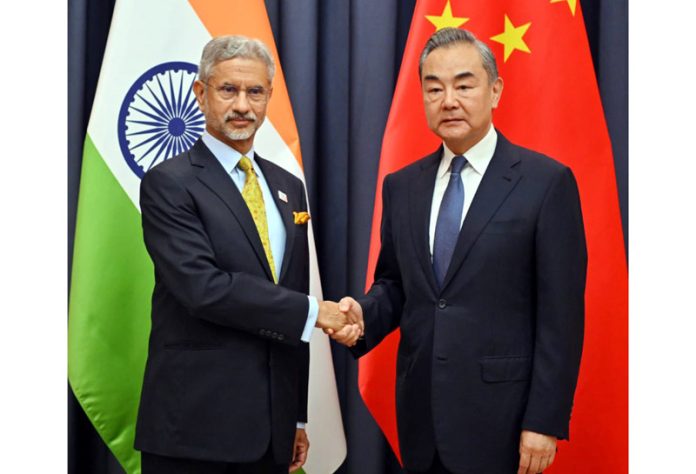
Jaishankar meets Chinese FM
*Cross-border terror requires decisive response
ASTANA, July 4:
India and China on Thursday vowed to redouble efforts to resolve the remaining issues in eastern Ladakh at the earliest and “stabilise and rebuild” ties even as External Affairs Minister S Jaishankar conveyed to his Chinese counterpart Wang Yi during a meeting that the Line of Actual Control (LAC) must be respected.
Click here to watch video
In the talks held on the sidelines of the summit of the Shanghai Cooperation Organisation (SCO), Jaishankar underlined the need for fully abiding by relevant bilateral agreements and protocols reached between the two sides in the past for the management of the border.
In a statement, the Ministry of External Affairs (MEA) said Jaishankar and Wang had an in-depth exchange of views on finding an early resolution of the remaining issues along the LAC in eastern Ladakh to “stabilise and rebuild bilateral relations.”
Click here to connect with us on WhatsApp
In the meeting, the External Affairs Minister also reaffirmed India’s persistent view that the relations between the two sides must be based on mutual respect, mutual interest and mutual sensitivity.
“Met with CPC Politburo member and FM Wang Yi in Astana this morning. Discussed early resolution of remaining issues in border areas. Agreed to redouble efforts through diplomatic and military channels to that end,” Jaishankar said on ‘X’.
“Respecting the LAC and ensuring peace and tranquillity in the border areas is essential. The three mutuals – mutual respect, mutual sensitivity and mutual interest – will guide our bilateral ties,” he said.
India has been maintaining that its ties with China cannot be normal unless there is peace in the border areas.
“Both Ministers agreed to continue and step up meetings of the diplomatic and military officials of the two sides to take forward their discussions to resolve the remaining issues at the earliest,” the MEA said.
“To that end, they agreed that the Working Mechanism on Consultation and Coordination on India-China Border Affairs (WMCC) should hold an early meeting,” it said.
The MEA said Jaishankar reiterated that the India-China relationship is best served by observing the three mutuals — mutual respect, mutual sensitivity and mutual interests.
It said the two Ministers agreed that the prolongation of the current situation in the border areas is not in the interest of either side.
“The External Affairs Minister highlighted the need to redouble efforts to achieve complete disengagement from the remaining areas in eastern Ladakh and restore border peace and tranquillity in order to remove obstacles towards the return of normalcy in bilateral relations,” the MEA said.
“He reaffirmed the importance of fully abiding by relevant bilateral agreements, protocols, and understandings reached between the two Governments in the past. The Line of Actual Control must be respected and peace and tranquillity in the border areas always enforced,” it said.
The Jaishankar-Wang talks came amid the dragging border row in eastern Ladakh that entered its fifth year in May.
The Indian and Chinese militaries have been locked in a standoff since May 2020 and a full resolution of the border row has not yet been achieved though the two sides have disengaged from a number of friction points.
The ties between the two countries nosedived significantly following the fierce clash in the Galwan Valley in June 2020 that marked the most serious military conflict between the two sides in decades.
The two sides held the last round of high-level military talks in February with an aim to resolve the row.
Though there was no indication of a breakthrough at the 21st round of talks, both sides agreed to maintain “peace and tranquillity” on the ground and continue the communication on the way ahead.
Meanwhile, India on Thursday asked the international community to “isolate and expose” those countries that harbour terrorists, provide safe havens and condone terrorism, saying that if left unchecked, terrorism can become a major threat to regional and global peace, in a veiled jibe at China and Pakistan.
Delivering Prime Minister Narendra Modi’s remarks at the Shanghai Cooperation Organisation (SCO) Council of Heads of State Summit in the Kazakhstan capital Astana, External Affairs Minister S Jaishankar, who was physically present at the meeting, recalled that one of the original goals of the SCO is to combat terrorism.
“Many of us have had our experiences, often originating beyond our borders. Let us be clear that if left unchecked, it can become a major threat to regional and global peace. Terrorism in any form or manifestation cannot be justified or condoned,” he told the summit, which was attended by Chinese President Xi Jinping, Pakistan Prime Minister Shehbaz Sharif and and Russian President Vladimir Putin among others.
He said that the international community “must isolate and expose those countries that harbour terrorists, provide safe havens and condone terrorism”, in an apparent reference to Pakistan and its all-weather ally China which has often put on hold on proposals in the United Nations to blacklist the Pakistan-based wanted terrorists.
“Cross-border terrorism requires a decisive response and terrorism financing and recruitment must be resolutely countered. We should also take proactive steps to prevent the spread of radicalisation among our youth,” he said, adding that the joint statement issued during India’s Presidency last year on this subject underlines New Delhi’s shared commitment. (PTI)

